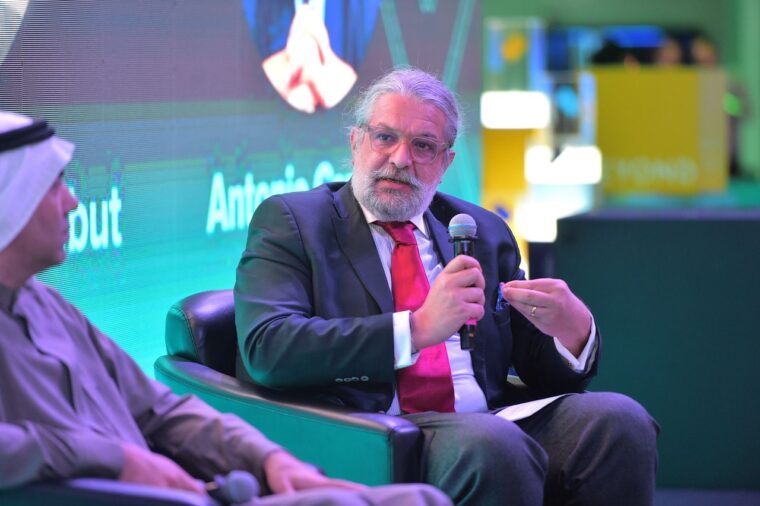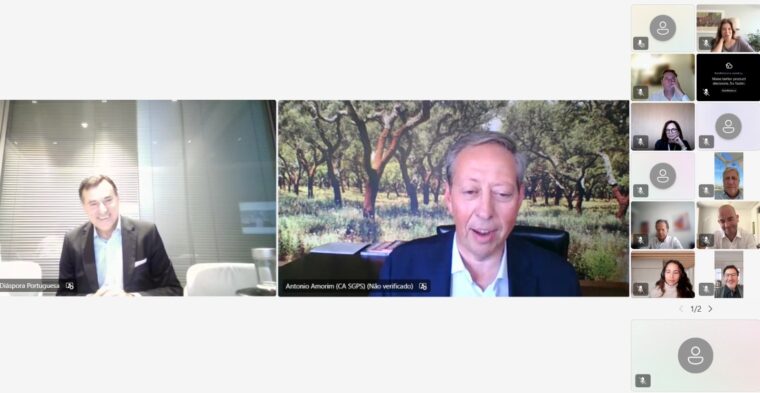As part of the partnership between the Portuguese Diaspora Council and Jornal de Negócios, Artur Duarte, CEO at Tranquilidade Angola and Counselor of the Africa Regional Hub, was interviewed by Jornal de Negócios. In the interview, Artur Duarte discussed his professional journey and identified competitive opportunities for Portugal, its economy, companies, and entrepreneurs in general.
1 – WHAT LED YOU TO LEAVE PORTUGAL?
My departure from Portugal was part of the internationalization program of the financial group I was working for in 2010. I was an advisor to the Board of Directors for this program, and I was chosen to lead the process of establishing new companies from scratch (start-ups), acquisitions, or joint ventures in markets that aligned with the group’s strategy.
2 – WHAT ADVANTAGES OR DISADVANTAGES HAS THE FACT THAT YOU ARE PORTUGUESE BROUGHT YOU?
I have always considered being Portuguese a valuable asset, not least because Portugal maintains good diplomatic relations with most other countries. Additionally, the Portuguese enjoy a positive image abroad, being recognized for their technical expertise and high productivity.
They are also known for their ethical conduct, humility, and reliability—qualities I consistently saw acknowledged by third parties in all negotiation processes or during the establishment phase with local regulatory authorities. We were always very well received.
For all these reasons, I firmly believe that Portuguese professionals represent a strategic asset for international expansion and contribute to strengthening Portugal’s soft power abroad.
3- WHAT OBSTACLES DID YOU HAVE TO OVERCOME AND HOW DID YOU DO IT?
Throughout my journey, two major challenges significantly shaped my experience and required a highly conscious and strategic approach.
Firstly, Portugal’s external image as an internationalizing country was still somewhat limited at the time. In the markets where we operated, there was often a perception that Portuguese projects lacked the scale, continuity, and robustness to compete with initiatives from regions more accustomed to exporting services and knowledge.
Secondly, there was the equally demanding challenge of building truly mixed teams, composed of both expatriate professionals and local talent. Striking this balance is often difficult, due to differences in professional cultures and the varying pace of adaptation on both sides.
Our approach focused on valuing local technical expertise, investing heavily in training and continuous development, and, above all, fostering a shared sense of purpose. Developing local leadership became a priority—not only as a sign of integration, but as a foundation to ensure the long-term sustainability and deep-rootedness of the projects on the ground.
4 – WHAT DO YOU MOST ADMIRE ABOUT THE COUNTRY YOU ARE CURRENTLY IN?
What impresses me the most is, without a doubt, the resilience of people and companies. There is a remarkable inner strength—a capacity to remain steadfast and determined even in the face of major obstacles.
The way challenges are confronted—with optimism, courage, and an unwavering faith in the future—is truly inspiring. Even in highly adverse contexts, when solutions seem out of reach, there is a persistent attitude of not giving up, of moving forward with conviction.
This mindset, so deeply rooted in active hope, stands in contrast to environments where discouragement takes hold easily. Here, adversity is seen as a catalyst for finding solutions—often with limited resources, but with an extraordinary will to make things happen.
5 – WHAT DO YOU ADMIRE MOST ABOUT THE COMPANY / ORGANIZATION YOU ARE IN?
Speaking about the organization as a whole, what stands out the most is the way its processes are structured and its core business firmly consolidated. This foundation enables an approach that is both innovative in distribution and rigorous in risk management. This combination ensures sustained performance growth, with visible and consistent impact.
The ability to attract, integrate, and develop new talent is equally remarkable. The organization manages to renew and upgrade skill sets harmoniously, fostering a culture of continuous learning that is clearly reflected in the steady rise of internal competency levels. This human development process is not imposed — it happens naturally and organically, with full team involvement, resulting in a genuine culture of knowledge-sharing and collective growth.
The strength of the brand and the values that support it are, in themselves, sources of pride and motivation. They are easily recognized and embraced by employees, reinforcing a strong sense of belonging and alignment with the organization’s purpose.
6 – WHAT RECOMMENDATIONS DO YOU HAVE FOR PORTUGAL, ITS ENTREPRENEURS AND MANAGERS?
First and foremost, I recommend drawing inspiration from the many positive examples of Portuguese companies, entrepreneurs, and managers who have successfully established themselves in international markets. These cases clearly demonstrate that Portugal has the capability, talent, and vision to compete at the highest level—when there is strategy, preparation, and persistence.
It is essential to approach foreign markets with a medium- to long-term perspective, rather than viewing them as one-off opportunities or tactical moves. Internationalization is, above all, about building lasting relationships, investing in local adaptation, respecting cultural contexts, and developing value propositions tailored to each reality.
Internationalization offers opportunities that go far beyond financial growth. It allows organizations to evolve, challenge their internal models, acquire new skills, and gain scale and resilience. When well managed, it enriches the company at all levels — strategic, human, technological, and cultural.
That is why my appeal is for Portugal and its entrepreneurs to resist short-term thinking. To avoid reactive decisions driven only by quick wins or favorable market conditions, and instead invest in sustainable, well-structured models based on knowledge, trust, and on-the-ground presence.
7 – IN WHICH SECTORS OF THE COUNTRY WHERE YOU LIVE CAN PORTUGUESE COMPANIES FIND CUSTOMERS?
Angola continues to offer significant business opportunities, particularly for companies that bring know-how, solutions tailored to the local context, and a medium- to long-term approach.
The productive sectors—particularly agriculture and industry—are emerging as top priorities. The country has been increasingly focused on diversifying its economy, reducing its dependence on oil, and promoting local production of food and processed goods. In this context, Portugal can add substantial value, both through decades of accumulated technical expertise and its experience in small- and medium-scale projects with strong territorial impact.
Another sector with enormous potential is tourism. Angola boasts untapped natural and cultural wealth, with landscapes, biodiversity, and heritage that rival some of Africa’s most sought-after destinations. Portugal’s experience in hospitality, food service, tourism training, and destination management can play a key role in supporting the sustainable development of this sector—both domestically and in positioning Angola internationally as a tourism destination.
8 – IN WHICH SECTORS IN PORTUGAL COULD COMPANIES IN THE COUNTRY WHERE YOU ARE WANT TO INVEST?
Despite the current global instability in international relations, I strongly believe in the continued growth of people mobility and the economic activity generated by these movements, particularly in areas such as food exports and real estate.
These investments can also be made through shared-capital partnerships in initiatives developed across both countries, thereby strengthening business relations and fostering a more favorable business environment.
9 – WHAT IS THE COMPETITIVE ADVANTAGE OF THE COUNTRY YOU ARE IN THAT COULD BE REPLICATED IN PORTUGAL?
Although these are distinct realities and economies at different stages of development, I believe Angola offers a competitive advantage that Portugal could better recognize and actively integrate into its future strategy: the potential of its young population.
Angola stands out for having a predominantly young and dynamic population, with increasing access to education and a strong desire to grow and contribute to the country’s development. When properly empowered, this human capital represents a workforce with high growth potential, adaptability, and ambition.
10 – ARE YOU THINKING OF RETURNING TO PORTUGAL? WHY?
Yes, it will very much depend on the project I’m involved in and the opportunities that arise. But being Portuguese ‘out in the world’ is something that brings me great satisfaction — perhaps it’s truly something that’s in our DNA.







